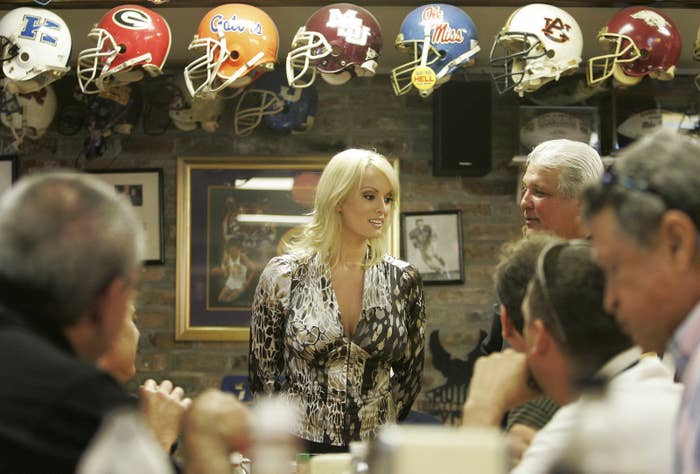
There’s a group of people who are uniquely qualified to lead the rollicking global conversation about sexism, sexuality, privilege, and power that is being fueled by daily reports of sexual assault by powerful men. These are people who know more about the negotiation of sexual boundaries than anyone else on the planet — and right now, they are barely being listened to.
As an attorney, I’ve been representing and advocating for sex workers for over 15 years. Their working lives are spent grappling with how to safely satiate sexual desires in a puritanical society that tells us sex is mostly bad and shameful. Their labor demands the constant creation and affirmation of sexual limits in a professional setting — something most people clearly struggle with.
When it’s done right, sex work is a straightforward and consensual form of sexual interaction in a deeply uneven world — money is power, sex is power, and the two can be consensually exchanged for mutual benefit in clear and honest ways. The entire sexual self can be acknowledged, seen, and enjoyed.
Not all sexual labor is empowering or even consensual — I have represented dozens of survivors of human trafficking who have suffered extreme abuse at the hands of traffickers, police, and to a lesser extent, clients. This is labor exploitation — and yet, again, survivors of this horrific abuse know more than most about the importance of consent and the creation of boundaries — and about the pathologies of men inclined to disregard these things.
It’s worth noting that, as you are reading this article, a veteran sex worker is at the heart of a presidential scandal. If you pay close attention to the words of Stephanie Clifford, aka Stormy Daniels, as she describes her sexual relationship with President Trump — one in which she clearly never sought his affection or romance, and for which she eventually got recognition and payment — it gives an insight into Trump’s character that few others were talking about back in 2011, when she gave her tell-all interview.
Saturday Night Live recently had a troubling take on Ms. Clifford, with Cecily Strong playing a campy Stormy Daniels, saying she was the “hero we deserve” right now — the joke being that we might be saved by a woman who sells sex for a living. But SNL got it all wrong: She is not the hero we deserve, but the hero we may need, and her SNL portrayal underpins the mainstream liberal discomfort with overt female sexuality, and sex workers in particular.
After Ms. Clifford’s story was made public, Trump’s opponents began searching for other sex workers who might have stories of their own — they even used the AVN Adult Entertainment Awards last week in Las Vegas as a place to uncover further dirt on the president. Who knows what they might discover.
It says a lot about our society that people on the front lines of negotiating sexual boundaries are criminalized, stigmatized, and shamed, with their work seen as dirty, delinquent, and inherently wrong. This speaks to the larger issues at hand — sexuality, in and of itself, is not a bad or fearful human experience. It is deeply and fundamentally human, instinctual, and necessary for our survival. Where we go wrong is through imposing stigma and criminalization onto sex. This is one of the factors that leads to people behaving badly: When we are at odds with our fundamental human instincts, inevitably, there is conflict.
Sex workers know all about this, too: Many people are forced to stay in abusive situations through the cultural stigma, shame, criminalization, systemic disempowerment, and alienation from families that can come with their sexual labor. In some cases, ill-intentioned men and women put them in these positions and keep them there. But our puritanical and punishing society provides fertile ground for those seeking to exploit vulnerable women.
Feminists understand that rape is not about sex, it is about power. But this particular type of power utilizes and manipulates our society’s broken approach to sex. And if we could just acknowledge individuals’ conflicting and perhaps even unsettling sexual needs, we could begin to more functionally and healthily deal with them.
What might that look like? First, a removal of criminal penalties from all consensual adult sexual behavior. Criminal consequences for consensual sex is a fundamentally unhealthy, harmful, and punitive concept that should be abandoned.
Second, we need to grapple with the uncomfortable and potentially conflicting sexual needs people may have — and people need to know how to safely, progressively, and openly acknowledge and act upon them. Sexual discomfort, confusion, and insecurity are part of the visceral human experience. It is not inherently bad or violating, although it certainly can be.
Third, we need to reframe our approach to sexuality to not only minimize abuse, but also support and empower victims to come forward. We must let go of the notion of a perfect victim or a completely evil perpetrator — everyone’s lives and histories are complex, and that complexity is what makes us imperfectly human. How can we all take ownership and control of our bodies, our sexuality, and our sex lives in a positive and empowering way, separating out abusive, power-driven assault from healthy sexuality?
Sex workers deal with these questions every day. It’s time to listen to them as we search for the answers.
Melissa Sontag Broudo, JD, MPH, coexecutive director of the SOAR Institute has worked with sex workers and survivors of human trafficking for over 15 years as an activist and attorney.
